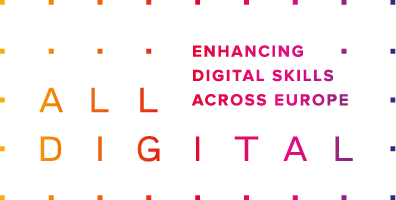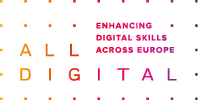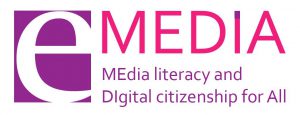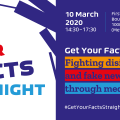
07 May Media Literacy and Digital Citizenship for All: the e-Media project experience and results
07 May, 2021
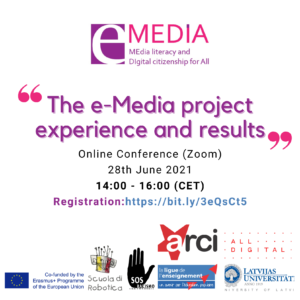
Here our story begins. “e-Media: Media Literacy and Digital Citizenship for Everyone” project (e-Media) aims to promote education for all by producing educational guidelines related to digital practices which consist of three handbooks. These handbooks are supporting possibilities for a new and innovative way of teaching different subjects at school. The handbooks are devoted to three aspects of digital competence:
1) Educational robotics: to develop computational thinking with hands-on activities
2) Media literacy: to understand the power and the risks of online media.
3) Online expression: to promote wiser use of social media, blogs, web radios and web TVs.
The online event presented the tools, activities and best practices, implemented by the project partners in Belgium, Italy, France, Latvia, and Spain.
The conference brought together representatives of policy makers and civil society organisations who discussed the importance of media literacy for teachers and educators in formal and non-formal education, and the main policies that promote media literacy of educators.
PROGRAMME
14:00 – 14:10 Welcome from ALL DIGITAL
Peter Palvolgyi, CEO, ALL DIGITAL
14:10 – 14:20 Overview of the e-Media project results
Aurélie Gaudin, e-Media Project Coordinator, La Ligue de L’enseignement
14:20 – 15:40 Panel Debate: The importance of Media Literacy for Educators in formal and non-formal education
Moderator: Gabriela Ruseva, Media Literacy Programme Officer, ALL DIGITAL
- Juliane von Reppert-Bismarck – Founder and CEO, Lie Detectors
- Marta Markowska – Directorate General for Education, Youth Sport and Culture EAC.C4. – Digital Education, European Commission. (Download Presentation Here)
- Luna Badawi – Youth facilitator and digital media researcher, In cooperation with ARCI
Q&A
15:40 – 16:00 e-Media partners’ experiences and future perspectives
Moderator: Aurélie Gaudin, e-Media Project Coordinator, La Ligue de L’enseignement
Q&A
16:00 Closing of the event
SPEAKERS
Juliane von Reppert-Bismarck, Founder and CEO, Lie Detectors
Juliane von Reppert-Bismarck is the founder and Executive Director of Lie Detectors, an award-winning and journalist-led news-literacy organisation raising awareness of disinformation and media bias among schoolchildren and their teachers. She directs Lie Detectors’ development and strategy and designed its concept and training approach. Juliane represented Lie Detectors within the European Commission’s High Level Expert Group on Digital Disinformation and Fake News and has advised politicians and lawmakers on anti-radicalisation and lateral literacy in an age of media pluralism.
To create Lie Detectors, Juliane put aside an award-winning journalism career, during which she wrote for The Wall Street Journal, Newsweek, Reuters, MLex and Spiegel Online among others, reporting from Europe and the US as well as from sub-Saharan Africa, the Middle East and Arctic. She is an alumna of New York City’s Columbia University Graduate School of Journalism and the University of Edinburgh and speaks German, English, Spanish and French.
Luna Badawi, Youth facilitator and digital media researcher – In cooperation with ARCI
 Luna Badawi holds a bachelor’s degree in communication, media and journalism and master’s degree in public and political communication strategies from the University of Florence. She works as linguistic mediator, intercultural communicator and youth operator.
Luna Badawi holds a bachelor’s degree in communication, media and journalism and master’s degree in public and political communication strategies from the University of Florence. She works as linguistic mediator, intercultural communicator and youth operator.
Since 2017 she has cooperated with ARCI association to raise youth awareness about e-media education and online hate speech in schools.
She believes that peer to peer education method is one of the most effective way to bring students and young people closer to the social issues and put the light on the power and also the risk of digital tools. Luna Badawi, speaks Italian, Arabic, English and French.
Marta Markowska, Directorate General for Education, Youth Sport and Culture EAC.C4. – Digital Education, European Commission
Marta Markowska is a Policy Officer for Digital Education in the Directorate-General for Education, Youth, Sport, and Culture at the European Commission in Brussels. Her previous policy work in the European Commission focused on social inclusion and equality, implementation of the European Strategic Framework for Education and Training as well as working as a Press Officer.
Prior to joining the European Commission, Marta worked as a teacher, television story producer and public relations adviser in Canada, the US and South Korea. She completed her undergraduate honours degree at Queen’s University in Kingston, Ontario and her post-graduate studies at Algonquin College in Ottawa. Born in Poland, and raised in Canada, she returned to Europe whereby she completed her Masters Degree in European Studies at the Jagiellonian University in Krakow, Poland after which she started her work with the European Commission. She currently lives in Brussels and is a mom to two little boys.
